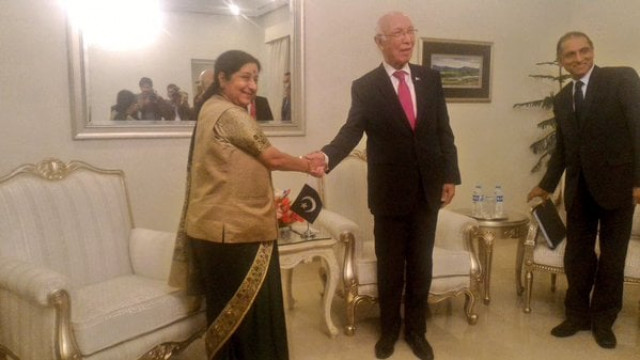A door opens
India and Pakistan have decided to talk peace again, and this time it looks like there is something tangible afoot

Indian External Affairs Minister Suhsma Swaraj shakes hands with Adviser to PM on Foreign Affairs Sartaj Aziz in Islamabad on December 9, 2015. PHOTO: TWITTER/@EMAIndia

None of this has happened by chance, including the meeting between our prime minister and the Indian Prime Minister Narendra Modi in Paris on the sidelines of the climate change conference. Their previous ‘chance meeting’ in Ufa had misfired but both decided to try again and this time it all clicked together. The meeting of both sides in Bangkok — not a venue previously used by either side — quickly led to a formal meeting in Islamabad on December 9. The Indian External Affairs Minister Sushma Swaraj really did have big news after two hours of discussion. The smiles were real, the body language reasonably relaxed and a new beginning was anointed — the Comprehensive Composite Dialogue. It is the word ‘comprehensive’ that is the game changer, because it brings everything to the table. No exclusion clauses but instead inclusivity and a pluralism of goals, none of them easily achieved.
The Indian side dropped its demand that any dialogue had to be around a single agenda item — terrorism — and the wheels began to turn. The agenda now is long and complicated but there is much to discuss and resolve. It reads as a blueprint for rapprochement — peace and security, confidence-building measures and the vital people-to-people element of religious tourism — Jammu and Kashmir, Siachen, Sir Creek, trade and investment, counterterrorism, narcotics control and humanitarian issues. Each of these would require a separate piece of diplomatic and political activity, but by bundling them together, they can be tackled piece by piece and we must have no expectation that every item will be ticked off in unison.
In some senses, the agreement to resume dialogue was the easy part. Turning words into reality is where it gets difficult. There is no ‘easy’ item on the list and for any of them to be conclusively resolved — and it must be remembered that India and Pakistan have never yet resolved a single one of their multiple differences since Partition — there has to be real negotiation and equally real compromise. There will be giving and taking as a part of any future process and Pakistan, like India, is going to win some and lose some, both to the detriment of neither in the big picture.
The decision to start the process from scratch is exactly right. The Mumbai attacks of 2008 were the point at which the always stuttering peace process ground to a halt, since when there has been a messy ganglion of rhetoric, bombast, political showboating and mutual recrimination. A line had to be drawn if this was not to continue ad nauseum and, it would appear, now it has been. The process will take years, and some early confidence-building measures are appropriate and relatively easily achievable — both countries must stop persecuting poor fisherfolk and Pakistan needs to stop dragging its feet in respect of prosecuting those involved in the Mumbai attacks. A real and durable ceasefire along the Line of Control and another in the wastes of the Siachen Glacier would not go amiss either. Just possibly a corner can be turned. If it could, then the potential thus released may be boundless both for India and Pakistan.
Published in The Express Tribune, December 11th, 2015.
Like Opinion & Editorial on Facebook, follow @ETOpEd on Twitter to receive all updates on all our daily pieces.















COMMENTS
Comments are moderated and generally will be posted if they are on-topic and not abusive.
For more information, please see our Comments FAQ